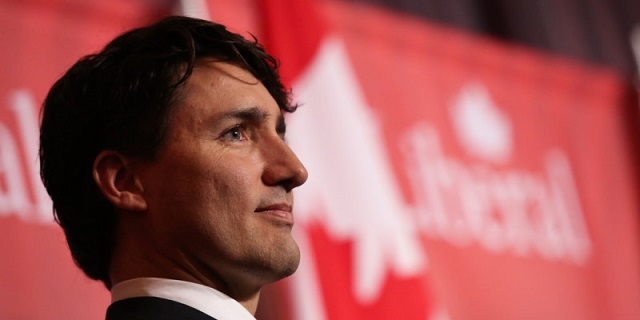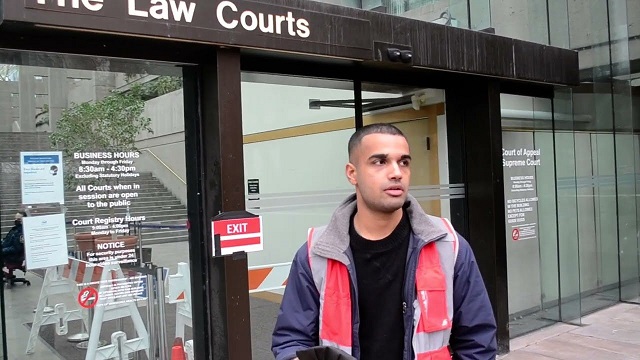Economy
Ottawa should follow Britain and tap the brakes on ‘net zero’

From the Fraser Institute
In a recent speech, British Prime Minister Rishi Sunak put a dent in the façade of the global “net zero” greenhouse gas emission agenda—that is, the idea that countries will emit no more greenhouse gases (such as CO2 and methane) into the air than are taken back out and “sequestered” in some form that won’t increase atmospheric heating. The net zero framework has subsumed virtually all energy, environment and natural resource policies in many countries including Canada.
Sunak did not reject net zero, but he clearly took his foot off the gas and started tapping the brake, acknowledging that people are not happy with the way it’s playing out: “We seem to have defaulted to an approach which will impose unacceptable costs on hard-pressed British families. Costs that no one was ever told about, and which may not actually be necessary to deliver the emissions reduction that we need.”
And Sunak extended some timelines in the United Kingdom’s net zero program. His government increased the deadline for ceasing sales of new internal combustion vehicles from 2030 to 2035. And rather than phasing out the sale of all gas boilers by 2035, the U.K. will phase out 80 percent of them by that date. The government will also now not require homeowners and landlords to meet various energy efficiency guidelines. Small changes to a large program, but a pioneering move away from today’s net zero timelines.
Here at home, Canadians also labour under the economic impacts of the Trudeau government’s net zero zeal. Canada’s carbon tax, a key net zero pillar, slated to rise to $170 per tonne by 2030, will put the hurt on Canadian households well in excess of the rebates given out by Ottawa. And a $170-per tonne carbon tax will cause the economy to shrink by about 1.8 per cent, causing a permanent loss of nearly 185,000 jobs and reducing real incomes in every province.
Similarly, according to the Parliamentary Budget Officer, 60 per cent of households in Alberta, Ontario, Saskatchewan and Manitoba—the four provinces where the federal carbon tax applies—will pay more in carbon taxes than they get in rebates. By 2030, 80 per cent of households in Ontario and Alberta will be worse off and 60 per cent will be worse off in Manitoba and Saskatchewan.
Of course, the cost impacts of Canada’s net zero plan will likely expand well beyond the carbon tax, with emission caps on Canada’s oil and gas sector, a net zero goal for Canadian waste management, ambitious (some would say impossible) mandates to electrify transportation in Canada, new “Clean Electricity Regulations” that will raise the cost of electricity, energy-efficient construction standards that can only further increase the already insane costs of housing and commercial property development in Canada, and possible restrictions on agricultural use of fertilizers that could raise Canadian food prices beyond even today’s outrageous levels.
Sunak’s net zero slowdown is not exactly the stuff of Brexit, but it may be a harbinger of things to come for other countries shaking under the weight of their own net zero ambitions. Most importantly, it’s a precedent other governments can invoke to justify adjusting their own destructive net zero programs. The Trudeau government would do well to follow Sunak’s lead and reduce net zero targets, soften timelines, remove regulatory burdens, and generally reform the policy before the full brunt of the economic impact throws more Canadian households into the red.
Author:
Business
Taxpayers criticize Trudeau and Ford for Honda deal

From the Canadian Taxpayers Federation
Author: Jay Goldberg
The Canadian Taxpayers Federation is criticizing the Trudeau and Ford governments to for giving $5 billion to the Honda Motor Company.
“The Trudeau and Ford governments are giving billions to yet another multinational corporation and leaving middle-class Canadians to pay for it,” said Jay Goldberg, CTF Ontario Director. “Prime Minister Justin Trudeau is sending small businesses bigger a bill with his capital gains tax hike and now he’s handing out billions more in corporate welfare to a huge multinational.
“This announcement is fundamentally unfair to taxpayers.”
The Trudeau government is giving Honda $2.5 billion. The Ford government announced an additional $2.5 billion subsidies for Honda.
The federal and provincial governments claim this new deal will create 1,000 new jobs, according to media reports. Even if that’s true, the handout will cost taxpayers $5 million per job. And according to Globe and Mail investigation, the government doesn’t even have a proper process in place to track whether promised jobs are actually created.
The Parliamentary Budget Officer has also called into question the government’s claims when it made similar multi-billion-dollar handouts to other multinational corporations.
“The break-even timeline for the $28.2 billion in production subsidies announced for Stellantis-LGES and Volkswagen is estimated to be 20 years, significantly longer than the government’s estimate of a payback within five years for Volkswagen,” wrote the Parliamentary Budget Officer said.
“If politicians want to grow the economy, they should cut taxes and red tape and cancel the corporate welfare,” said Franco Terrazzano, CTF Federal Director. “Just days ago, Trudeau said he wants the rich to pay more, so he should make rich multinational corporations pay for their own factories.”
Business
Maxime Bernier warns Canadians of Trudeau’s plan to implement WEF global tax regime

From LifeSiteNews
If ‘the idea of a global corporate tax becomes normalized, we may eventually see other agreements to impose other taxes, on carbon, airfare, or who knows what.’
People’s Party of Canada leader Maxime Bernier has warned that the Liberal government’s push for World Economic Forum (WEF) “Global Tax” scheme should concern Canadians.
According to Canada’s 2024 Budget, Prime Minister Justin Trudeau is working to pass the WEF’s Global Minimum Tax Act which will mandate that multinational companies pay a minimum tax rate of 15 percent.
“Canadians should be very concerned, for several reasons,” People’s Party leader Maxime Bernier told LifeSiteNews, in response to the proposal.
“First, the WEF is a globalist institution that actively campaigns for the establishment of a world government and for the adoption of socialist, authoritarian, and reactionary anti-growth policies across the world,” he explained. “Any proposal they make is very likely not in the interest of Canadians.”
“Second, this minimum tax on multinationals is a way to insidiously build support for a global harmonized tax regime that will lower tax competition between countries, and therefore ensure that taxes can stay higher everywhere,” he continued.
“Canada reaffirms its commitment to Pillar One and will continue to work diligently to finalize a multilateral treaty and bring the new system into effect as soon as a critical mass of countries is willing,” the budget stated.
“However, in view of consecutive delays internationally in implementing the multilateral treaty, Canada cannot continue to wait before taking action,” it continued.
The Trudeau government also announced it would be implementing “Pillar Two,” which aims to establish a global minimum corporate tax rate.
“Pillar Two of the plan is a global minimum tax regime to ensure that large multinational corporations are subject to a minimum effective tax rate of 15 per cent on their profits wherever they do business,” the Liberals explained.
“The federal government is moving ahead with legislation to implement the regime in Canada, following consultations last summer on draft legislative proposals for the new Global Minimum Tax Act,” it continued.
According to the budget, Trudeau promised to introduce the new legislation in Parliament soon.
The global tax was first proposed by Secretary-General of Amnesty International at the WEF meeting in Davos this January.
“Let’s start taxing carbon…[but] not just carbon tax,” the head of Amnesty International, Agnes Callamard, said during a panel discussion.
According to the WEF, the tax, proposed by the Organization for Economic Co-operation and Development (OECD), “imposes a minimum effective rate of 15% on corporate profits.”
Following the meeting, 140 countries, including Canada, pledged to impose the tax.
While a tax on large corporations does not necessarily sound unethical, implementing a global tax appears to be just the first step in the WEF’s globalization plan by undermining the sovereignty of nations.
While Bernier explained that multinationals should pay taxes, he argued it is the role of each country to determine what those taxes are.
“The logic of pressuring countries with low taxes to raise them is that it lessens fiscal competition and makes it then less costly and easier for countries with higher taxes to keep them high,” he said.
Bernier pointed out that competition is good since it “forces everyone to get better and more efficient.”
“In the end, we all end up paying for taxes, even those paid by multinationals, as it causes them to raise prices and transfer the cost of taxes to consumers,” he warned.
Bernier further explained that the new tax could be a first step “toward the implementation of global taxes by the United Nations or some of its agencies, with the cooperation of globalist governments like Trudeau’s willing to cede our sovereignty to these international organizations.”
“Just like ‘temporary taxes’ (like the income tax adopted during WWI) tend to become permanent, ‘minimum taxes’ tend to be raised,” he warned. “And if the idea of a global corporate tax becomes normalized, we may eventually see other agreements to impose other taxes, on carbon, airfare, or who knows what.”
Trudeau’s involvement in the WEF’s plan should not be surprising considering his current environmental goals – which are in lockstep with the United Nations’ 2030 Agenda for Sustainable Development – which include the phasing out coal-fired power plants, reducing fertilizer usage, and curbing natural gas use over the coming decades.
The reduction and eventual elimination of so-called “fossil fuels” and a transition to unreliable “green” energy has also been pushed by the World Economic Forum – the aforementioned group famous for its socialist “Great Reset” agenda – in which Trudeau and some of his cabinet are involved.
-

 COVID-1916 hours ago
COVID-1916 hours agoPfizer reportedly withheld presence of cancer-linked DNA in COVID jabs from FDA, Health Canada
-

 Censorship Industrial Complex1 day ago
Censorship Industrial Complex1 day agoJordan Peterson, Canadian lawyer warn of ‘totalitarian’ impact of Trudeau’s ‘Online Harms’ bill
-

 Alberta2 days ago
Alberta2 days agoAlberta rejects unconstitutional cap on plastic production
-

 Alberta2 days ago
Alberta2 days agoAlberta official reveals ‘almost all’ wildfires in province this year have been started by humans
-

 Bruce Dowbiggin1 day ago
Bruce Dowbiggin1 day agoCome For The Graduate Studies, Stay For The Revolution
-

 Business2 days ago
Business2 days agoTaxpayers criticize Trudeau and Ford for Honda deal
-

 Business2 days ago
Business2 days agoDon’t be fooled by high-speed rail
-

 Alberta2 days ago
Alberta2 days agoPolitical parties will be part of municipal elections in Edmonton and Calgary pilot projects






